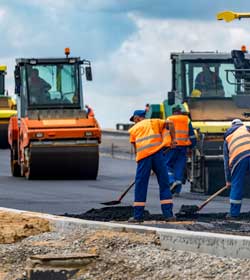A monetary gift, whether it be substantial
or modest, is cause for celebration.
Just ask members of the Association of Consulting Engineering Companies – Saskatchewan. In early May, the Saskatchewan government announced a $2 billion increase in infrastructure investment over two years to assist in economic growth following damage done by the coronavirus pandemic. The investment is a two-year capital plan, with a total investment of $7.5 billion.
This was welcome news for ACEC-Saskatchewan, many of whom were experiencing a sluggish market and some struggling with mental health issues, which highlights the grim reality that some in various sectors were experiencing.
“Some of our members’ margins were really tight before (the pandemic). With some of the sites shutting down, the delay in capital projects and word that some municipal projects might not be coming out, there is a lot of stress among senior managers at some of these consulting firms,” explained Beverly MacLeod, executive director with ACEC-SK.
“Consulting engineers, if they don’t have work, don’t get paid.”
Which is why the government’s announcement should be widely celebrated.
The government package includes the $2.7 billion crown and executive government capital spending from the government’s 2020-21 estimate, as well as the $2.8 billion projected for next year.
The government says the increase in investment will help balance the need for smaller, short-term projects to help kick-start the economy and get people back to work.
ACEC-SK members are ready to help deliver capital budgets. It is their work that must come first before construction can proceed.
“The consulting engineering industry is trying to position itself to be available and ready to assist the province with economic resilience and recovery,” MacLeod said. “A lot of the design work can be done remotely. That design piece that consulting engineers do is something they can do from home. They have a communication network set up so they can communicate with their teams.”v
Physical distancing and working from home are among the commonalities accepted during the COVID-19 pandemic.
For members belonging to ACEC-SK, these new adopted means of business have created challenges for routine operations.
“Consulting engineers and geoscientists deal with the public every day. They work in conjunction with other industries to deliver infrastructure and capital projects, things of that nature,” MacLeod said.
“Consultants are probably involved with more public exposure than just about any other kind of engineer, public or private. They are dealing with different clients and different teams every day.”
Pandemic ethics
With a broad spectrum of clients from the municipal, provincial and private sectors, among others, ACEC-SK members are responsible for the design specifications of public and private infrastructure projects, including roads and highways, schools and office buildings, technology and industrial facilities.
They provide advice, technical assistance or service to clients on these projects, most often, before a shovel hits the ground for construction.
As expected, consultants engage clients on these work sites. At least they used to before new health and safety guidelines were instituted in March.<
“Engineers have sometimes been asked to not enter work sites to conduct field work,” MacLeod said. “Instead, there are contractors who use a laptop or GoPro camera for engineers to look at remotely to let them know if construction meets the design specificationss that are provided.”
Questions related to professional ethics have spawned. Questions like, ‘Does that meet the requirement in its fullest sense?’ And, ‘Is it efficient enough to protect the public?’
“Is it safer to be on site and view the construction in person, or is it safer to not be on site and rely on technology?”
Additional challenges for ACEC-SK members include transportation to a work site. Can you have more than one person in a truck? Occupational health and safety and public health officials were creative and found ways to mitigate this with the proper personal protection equipment (PPE).
The hunt for PPE and hand sanitizer has been challenging. There also is a need for more portable washrooms on work sites to allow for frequent hand washing.
Be prepared
Was there a plan in place to deal with this almost-immediate pivot in operations?
“Some multi-jurisdictional members who plug in elsewhere did have pandemic plan already in place,” MacLeod said. “Perhaps some of the smaller ones may not have. They may have had business continuity plans in place – most of our members do – to be able to access their information and those sorts of things. That actually steps them quite far into the process of being able to work remotely.”
Telecommunication services have enabled virtual staff meetings through Zoom and FaceTime and allowed more people to work remotely. Broadband infrastructure has progressed enormously, while the tools have become far more sophisticated. Just when it is needed, the resources are available.
However, that major redistribution of people working from home has created unprecedented stress on network servers.
ACEC-SK members have assisted public engineers at SaskPower and SaskEnergy, among others, should they not have the capacity to manage the additional stress on servers, to maintain a sense of normalcy.
Consultants also have volunteered to assist public engineers with the maintenance of essential services like water, wastewater and power.
“Should a second coronavirus wave happen, consultant engineers are able and ready to assist with the repurposing of capital assets, whether that be for new electrical, new designs, various health needs, those sorts of things,” MacLeod added.
Routine business operations have changed over the past few months and new procedures, whether they be interim or permanent, have been adopted. Though change is something that often is viewed in a negative light as it strays from the established normal.
MacLeod’s advice to others in the industry is to reflect on this period to see if change has enabled business to run more efficiently.
“While this pandemic is horrendous – the health implications, it has knocked the economy back on its heels – it has also presented some opportunities to do business differently,” MacLeod said. “I would encourage the professionals to take a close look at efficiencies and different opportunities for communication and to harness those going forward to assist with the economic recovery.”

